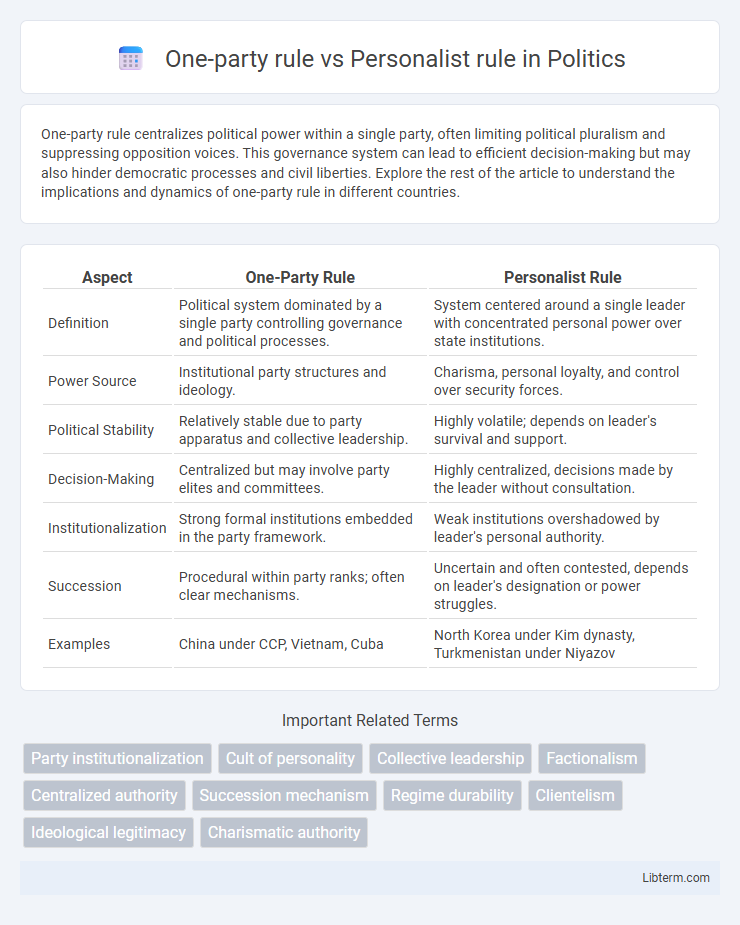One-party rule centralizes political power within a single party, often limiting political pluralism and suppressing opposition voices. This governance system can lead to efficient decision-making but may also hinder democratic processes and civil liberties. Explore the rest of the article to understand the implications and dynamics of one-party rule in different countries.
Table of Comparison
| Aspect | One-Party Rule | Personalist Rule |
|---|---|---|
| Definition | Political system dominated by a single party controlling governance and political processes. | System centered around a single leader with concentrated personal power over state institutions. |
| Power Source | Institutional party structures and ideology. | Charisma, personal loyalty, and control over security forces. |
| Political Stability | Relatively stable due to party apparatus and collective leadership. | Highly volatile; depends on leader's survival and support. |
| Decision-Making | Centralized but may involve party elites and committees. | Highly centralized, decisions made by the leader without consultation. |
| Institutionalization | Strong formal institutions embedded in the party framework. | Weak institutions overshadowed by leader's personal authority. |
| Succession | Procedural within party ranks; often clear mechanisms. | Uncertain and often contested, depends on leader's designation or power struggles. |
| Examples | China under CCP, Vietnam, Cuba | North Korea under Kim dynasty, Turkmenistan under Niyazov |
Introduction to Authoritarian Regimes
One-party rule in authoritarian regimes centralizes power within a single political party, suppressing opposition and maintaining control through institutionalized mechanisms and party loyalty. Personalist rule concentrates authority around a single leader who dominates decision-making, often relying on patronage, loyalty, and repression rather than structured party organizations. Both forms restrict political pluralism but differ in their reliance on party institutions versus individual charisma and personal networks.
Defining One-Party Rule
One-party rule is a political system where a single political party controls the government, marginalizing or completely outlawing opposition parties to maintain power and policy continuity. This system often features centralized decision-making and strict party discipline to enforce uniformity across state institutions. Unlike personalist rule, where power centers around an individual leader, one-party rule institutionalizes authority within a party structure that governs state functions collectively.
Characteristics of Personalist Rule
Personalist rule centers on the concentration of power in the hands of a single leader who exercises authority based on personal loyalty rather than institutional frameworks. It is characterized by the marginalization of formal political institutions, reliance on patronage networks, and the constant use of coercion to maintain control. Unlike one-party rule, which depends on a dominant political organization, personalist regimes often lack stable party structures and are highly vulnerable to leader-centric instability.
Historical Examples of Each System
One-party rule often exemplifies regimes like the Communist Party in the Soviet Union (1922-1991) and the Chinese Communist Party in China since 1949, where a single political party monopolizes power, suppressing opposition to maintain control. Personalist rule is characterized by leaders such as Idi Amin in Uganda (1971-1979) and Mobutu Sese Seko in Zaire (1965-1997), where power centers on an individual who dominates political institutions and embodies the state apparatus. These historical examples illustrate how one-party systems institutionalize governance through party structures, while personalist regimes revolve around the leader's cult of personality and personalized decision-making.
Power Distribution and Governance
One-party rule centralizes power within a single political party, institutionalizing governance through established bureaucracies and collective decision-making bodies, often ensuring stability and policy continuity. Personalist rule concentrates authority in the hands of a single leader who bypasses formal institutions, resulting in a more personalized and discretionary exercise of power with weakened institutional checks. Governance under one-party systems typically emphasizes party dominance and ideological control, whereas personalist regimes rely heavily on loyalty to the leader and personalized networks, affecting policy implementation and power distribution significantly.
Leadership Succession Mechanisms
One-party rule relies on institutionalized leadership succession mechanisms within the ruling party, such as party congresses or politburo decisions, to ensure continuity and legitimacy. In contrast, personalist rule centers succession around the leader's inner circle or family ties, often lacking formal procedures and leading to unpredictable power transitions. The stability of leadership succession in one-party systems is typically higher due to codified norms, whereas personalist regimes face greater risks of factionalism and conflict during transitions.
Policy Making and Flexibility
One-party rule centralizes policy making within a dominant political party, enabling structured yet often rigid decision processes guided by collective party ideology. Personalist rule concentrates power in a single leader, allowing for rapid, flexible policy changes driven by personal preferences rather than institutional constraints. This flexibility in personalist regimes can facilitate adaptive responses but increases unpredictability and risks inconsistent governance outcomes.
Impact on Political Stability
One-party rule often ensures political stability through centralized control and suppression of opposition, reducing public dissent and policy uncertainty. Personalist rule depends heavily on the leader's charisma and authority, which can lead to rapid shifts in stability based on the leader's health or political acumen. While one-party systems institutionalize governance, personalist regimes risk instability due to potential power struggles and lack of formal succession mechanisms.
Social and Economic Consequences
One-party rule often leads to centralized decision-making that can promote economic stability and coordinated social policies but may suppress political pluralism and limit social freedoms. Personalist rule tends to concentrate power around an individual, resulting in unpredictable economic policies and social systems vulnerable to favoritism and corruption. Both systems can hinder sustainable development due to lack of institutional checks, but one-party regimes typically sustain longer-term economic planning compared to the volatility seen in personalist regimes.
Future Trends and Global Implications
One-party rule may face increasing challenges from global demands for political pluralism and technological transparency, pushing regimes toward reforms or hybrid systems. Personalist rule risks instability as succession uncertainty and leader-centric governance become unsustainable in interconnected global markets. Both systems must adapt to evolving international norms on human rights and governance, impacting diplomatic relations and foreign investment flows worldwide.
One-party rule Infographic

 libterm.com
libterm.com